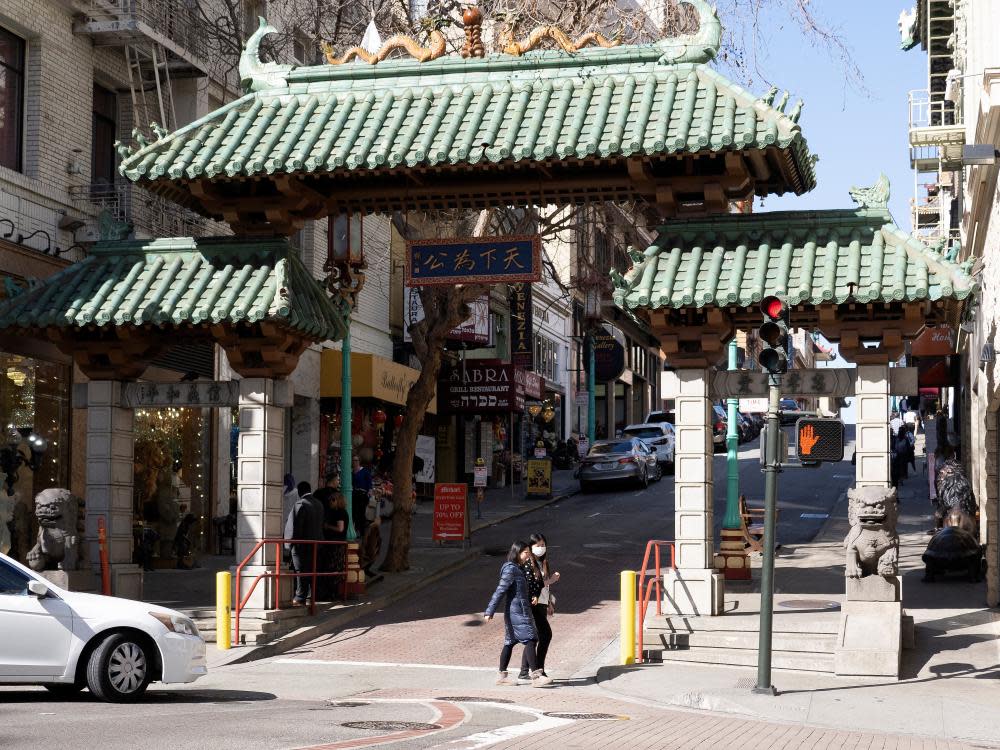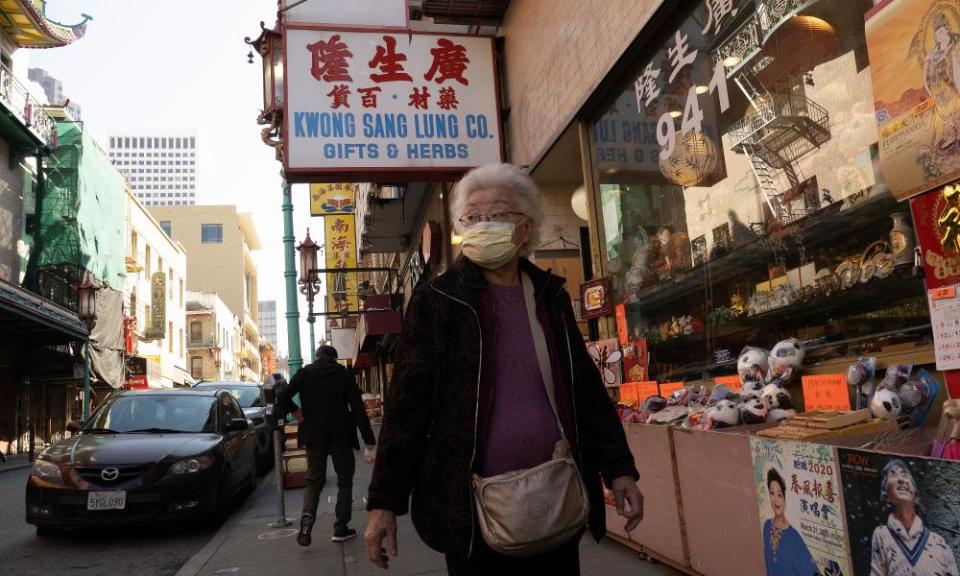'Please visit Chinatown': coronavirus fears empty San Francisco district

Most days you can’t walk through San Francisco’s historic Chinatown without bumping into a tourist’s extended arm, readying for a camera-phone photo.
Lunchtime in particular is usually a bustling affair. But on a recent weekday at the height of the coronavirus pandemic that has dominated Asian countries across the Pacific Ocean, there was a noticeable absence of foot traffic.
At the Dragon Gate on Grant Avenue, the entrance to Chinatown that is usually frequented for selfies, no one posed and no one snapped. The picturesque and Instagram-worthy red lanterns that hung between buildings went unphotographed, as did the bright mural of Bruce Lee and the ornate architecture. The erhu that an elderly gentleman played for no one outside Old Saint Mary’s Cathedral practically echoed down the street.
“As you can see, there’s nobody,” said Ivy Liu, store manager at Bargain Bazaar, as she took inventory in an empty store. “It’s really, really, really difficult. All the people, I don’t know where all the people have gone.”
Since the outbreak of the coronavirus, the largest and oldest Chinatown in the country has seen a drop in tourism, as a racially tinged fear has appeared to have kept visitors from its streets. There have been no confirmed cases of coronavirus in San Francisco, but even so, Chinatown regulars say the streets are less crowded, and people have begun to worry – not about the virus itself, they said, but on whether their businesses can survive this downturn.
The concern was enough that the House speaker, Nancy Pelosi, made a publicized stop this week in her home town’s Chinatown to implore people to “please come and visit and enjoy Chinatown”.
“We know that there is concern surrounding tourism, traveling all throughout the world, but we think it’s very safe to be in Chinatown and hope that others will come,” she said. “It’s lovely here.”
It was a pleasure to try my hand at making fortune cookies at the Golden Gate Fortune Cookie Factory (with a little guidance from owner Kevin Chan, of course).
The message inside?
“United We Stand.” pic.twitter.com/3piGq4yKXq— Nancy Pelosi (@SpeakerPelosi) February 25, 2020
Then, with no confirmed cases of the virus originating within city limits, San Francisco’s mayor, London Breed, declared a state of emergency. “I made an emergency declaration to strengthen SF’s response in the case of an outbreak,” she tweeted. “This is about preparedness.”
“I saw hope when Nancy Pelosi came by here,” Kevin Chan, owner of the Golden Gate Fortune Cookie Company, said grimly. “But then the next day London Breed declared an emergency.”
Chan has a sticker on the front door of his shop that reads, “Fight the virus, NOT the people”. When asked about how business has changed since the outbreak of coronavirus, he pulled up a video from last January that showed chattering schoolchildren in uniform and tourists lined up along the entire length of the alley to the front of his shop. On this recent weekday, however, only a few people trickled in every so often. Minutes would pass without anyone coming by for a free sample, to take in the sweet cookie smell of a San Francisco institution.

“A good day, people are in line to get in, waiting 10, 15 minutes to see it,” Chan said. “Now there’s no one. It’s dead. We have no people coming.”
He estimated that he had seen an 80% drop in foot traffic to his shop since the start of the outbreak, a staggering decrease that he knows will be devastating if reflected across the rest of the neighborhood. The little shops selling silks, figurines, china and fans rely on this steady flow of mostly tourists to buy souvenirs and keepsakes of their time in Chinatown.
“Some stores only made $7 in one day,” said Cindy Dent, an employee at T&L T-Shirt. “Some days they sold nothing. My store, sometimes only $100. On good days, we make $500 to $600. On a weekend, $800. It’s really bad.”
Chan is frustrated over the racism around these coronavirus fears.
“We are fully targeted because it’s from China,” he said. “But it’s not us. It’s everywhere. In San Francisco Chinatown, we didn’t go to China. We’re Chinese American here. Why are we targeted?”
Liu pointed out that in Chinatown, they have families, elderly and children as well that they want to protect from the coronavirus, yet somehow it’s assumed that they are unhealthy or not taking health precautions. “Of course we would be careful,” she said.
“It’s really not fair,” she said. “They just label us as the virus. We are not the virus. What can we do?”

 Yahoo News
Yahoo News 
